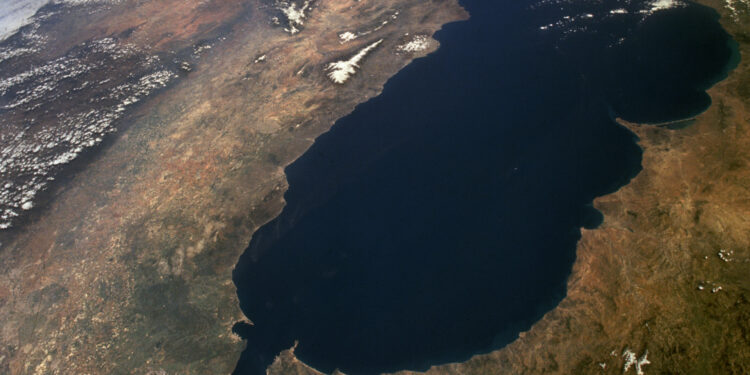The Strait of Gibraltar constitutes a natural physical barrier between the countries of Spain (to the north) and Morocco (to the south). In geological terms, the 16-kilometer strait that separates the two countries, as well as Europe and Africa, is located where the two main tectonic plates, the Eurasian Plate and the African Plate, collide. Credit: NASA, public domain, via Wikimedia Commons
A new study, using computer models, predicts that a subduction zone currently located beneath the Strait of Gibraltar will spread further into the Atlantic interior and help form an Atlantic subduction system – a ring of Atlantic fire. This will happen “soon” in geological terms, in about 20 million years.
The oceans seem eternal for our lifespan, but they are not there for long: they are born, grow and one day close. This process, which lasts a few hundred million years, is called the Wilson cycle. The Atlantic, for example, was born when Pangea broke apart about 180 million years ago and will one day close. And the Mediterranean is what remains of a large ocean – the Tethys – that once existed between Africa and Eurasia.
For an ocean like the Atlantic to stop growing and start closing, new subduction zones – places where one tectonic plate sinks beneath another – must form. But subduction zones are difficult to form, because they require plates to break and bend, and plates are very strong. One way to get out of this “paradox” is to consider that subduction zones can migrate from a disappearing ocean in which they already exist – the Mediterranean – to virgin oceans – like the Atlantic. This process has been called subduction invasion.
This study shows for the first time how such direct invasion can occur. The gravity-based 3D computer model predicts that a subduction zone currently located beneath the Strait of Gibraltar will spread further into the Atlantic interior and help form an Atlantic subduction system – an Atlantic Ring of Fire, by analogy with the structure already existing in the Pacific. . This will happen “soon” in geological terms, but not for about 20 million years.
“Subduction invasion is inherently a three-dimensional process that requires advanced modeling tools and supercomputers that were not available a few years ago. We can now simulate the formation of the Gibraltar Arc in great detail as well as how it could evolve in the distant future”, ” explains João Duarte, first author and researcher at the Instituto Dom Luiz, Faculty of Sciences of the University of Lisbon.
Image of crustal age of the Atlantic Ocean with plates. Credit: Mr. Elliot Lim, CIRES & NOAA/NCEI
This study sheds new light on the Gibraltar subduction zone, as few authors considered it still active because it has slowed down considerably over the last million years. According to these results, its slow phase will last another 20 million years and, after that, will invade the Atlantic Ocean and accelerate. This will be the start of crustal recycling on the eastern shore of the Atlantic and could be the start of the closure of the Atlantic itself.
“There are two other subduction zones on the other side of the Atlantic: the Lesser Antilles, in the Caribbean, and the Scotia Arc, near Antarctica. However, these subduction zones invaded the Atlantic several million years ago. Studying Gibraltar is an invaluable opportunity. because it allows us to observe the process at its beginnings, while it is happening,” adds João Duarte.
-
Map highlighting the Atlantic subduction zones, the fully developed Lesser Antilles and Scotia arcs on the west side and the nascent Gibraltar arc on the east side. From Duarte et al., 2018. Credit: João C. Duarte
-
Maps showing the evolution of the Gibraltar subduction zone from 30 million years ago to 50 million years in the future. From Duarte et al., 2024. Credit: João C. Duarte
Generally speaking, this study shows that invasion by subduction is probably a common mechanism for initiating subduction in Atlantic-type oceans and therefore plays a fundamental role in the geological evolution of our planet.
The discovery that Gibraltar subduction is still active also has important implications for seismic activity in the region. Subduction zones are known for producing the most powerful earthquakes on the planet. Events such as the Great Lisbon Earthquake of 1755 are a treat and require preparation.
The work is published in the journal Geology.
More information:
João C. Duarte et al, The Gibraltar subduction zone invades the Atlantic, Geology (2024). DOI: 10.1130/G51654.1
Provided by the University of Lisbon
Quote: How do the oceans start to close? New Study Suggests Atlantic May ‘Soon’ Enter Its Decline Phase (February 15, 2024) retrieved February 15, 2024 from
This document is subject to copyright. Apart from fair use for private study or research purposes, no part may be reproduced without written permission. The content is provided for information only.



